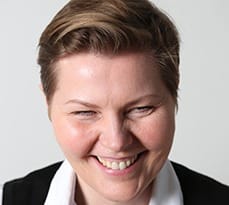Bringing the best from movies and technology to improve wellbeing

An alumna of Cambridge Social Ventures programme, run by the Cambridge Centre for Social Innovation at Cambridge Judge Business School, founded The Helpful Clinic aiming to help people get back on track – with a bit of help from the movies.

Thora Rain worked for a decade in the film industry in her native Iceland, Germany and Ireland, helping to produce movies “Der Garten Krieg” (a comedy about a gardening enthusiast going to extraordinary lengths in pursuit of his passion), “Maigret et le Port des Brumes” (about the famous fictional detective) and animation series such as “Loggerheads” (about Vikings).
Nearly 20 years later, Thora is using cinematic themes, techniques and even famous movie lines to help people address wellbeing issues through her social venture, The Helpful Clinic. “Movies are important part of our lives, so we should take advantage of it,” she says. “This therapy helps people reflect and see themselves in a different light.”
Specifically, the Helpful Clinic asks clients who may be down in the dumps or suffering from mental or physical health conditions to create a movie about themselves. Clients are asked questions like: “Have you ever tried to imagine your life as a movie? What kind of movie it would be? Who would play ‘you’? What period of your life would it show?”
The aim is to get people to step off the run-of-the-mill treadmill, at least for a little while, and try to imagine how others might see them – with a goal of better well-being.
For example, Anthony, who’s a senior manager at an international company, placed himself in a coming-of-age comedy depicting some of the significant events of his life – such as confrontational meeting with colleagues and breaking up with his girlfriend. He was asked which actor might portray him – he shortlisted Ewan MacGregor or Matt Damon – and then opted for the latter, reasoning that Damon reflected both his current strengths but also aspects of himself that he wanted to develop, aspiring to turn them into strengths.
He chose a comedy, because he was feeling that he viewed his life very seriously, and believed that a movie about himself in a lighter vein might help part the storm clouds. “Imagining Matt Damon in these situations helped me to see how I could have handled them differently, it was actually pretty mind-blowing” says Anthony.
Thora says that movies about a hero’s quest like “The Matrix” and “Mission Impossible” often provide a great framework for understanding that the hero’s quest isn’t a linear thing and doesn’t involve knowing everything beforehand. The trick is to learn how to use what’s to hand in any situation to move forward to the hero’s ultimate goal. The same applies to coming-of-age movies where the protagonist is learning valuable lessons to ultimately becoming the person they want to be.
Familiar lines from movies can also be helpful to people seeking better well-being, because such familiarity remind people of who they are, where they’ve been and where they want to go – this is useful in dealing with stress. Thora has devised a “First Aid Kit for Feelings,” in which clients choose movies, photos, songs or other things that might help them build resilience, strength and support how they are feeling. “It’s just like a normal first aid kit, but instead of plasters and paracetamol, it is packed with tools and tips on how to cope with stress, procrastination, anger and physical symptoms,” she says.
Thora’s road from films to using film for therapy took a few twists and turns along the way. In 2000 she joined Sun Microsystems software company in London as a project manager, and it was there she developed a keen interest in technology.
In 2002 she started Visual Culture studies at Anglia Ruskin University in Cambridge, but fell ill with Chronic Fatigue Syndrome that lasted for over six years. “For the first year I was pretty much housebound, needing extensive care and support. In terms of my studies, I couldn’t go to galleries or workshops, but I could watch movies and that helped me to cope and complete my course” she says.
Later, Thora studied for a Masters in Intercultural Communications at Anglia Ruskin, and finished training in Health and Wellness. She has been working as psychology practitioner in London and Cambridge since 2010, but had the idea about a venture where she could employ her own experience, clinical practice and creativity to offer workshops and one-to-one consultations. That’s how the Helpful Clinic was born in 2015.
A core team of three is based in Cambridge, but clients come from all around the world. “Technology (i.e. Skype) allows us to be flexible and environmental friendly as well as being accessible to someone who can’t physically attend the consultation due to illness, work commitments or location,” Thora says.
Karen Leigh Anderson, Business Advisor at Cambridge Social Ventures, was Thora’s mentor. She said: “Thora has chosen to run The Helpful Clinic as a social venture because this provides her with a framework of maintaining both running a business and delivering social change as priorities. Her model of the First Aid Kit for Feelings is an innovative way of combining self-help with a workshop and direct support.”
This article is part of Venturing Forth, our new series on the aspirations and challenges of ventures connected to students, alumni and others associated with Cambridge Judge Business School.

